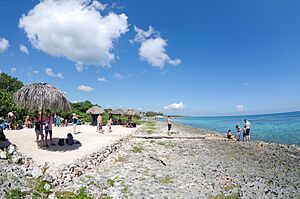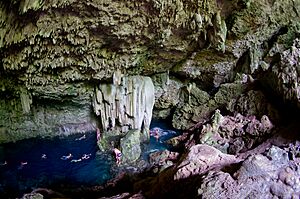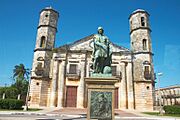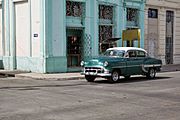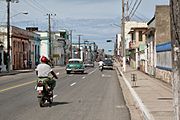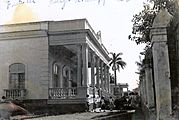Cárdenas, Cuba facts for kids
Quick facts for kids
Cárdenas
San Juan de Dios de Cárdenas
|
||
|---|---|---|
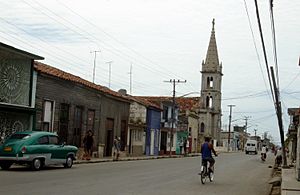
Street in Cárdenas
|
||
|
||
| Motto(s):
Primus In Cuba
|
||
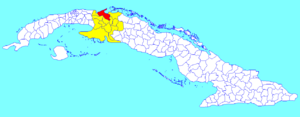
Cárdenas municipality (red) within
Matanzas Province (yellow) and Cuba |
||
| Country | Cuba | |
| Province | Matanzas | |
| Founded | 1828 | |
| Established | 1859 | |
| Area | ||
| • Total | 577.88 km2 (223.12 sq mi) | |
| Elevation | 10 m (30 ft) | |
| Population
(2022)
|
||
| • Total | 158,322 | |
| • Density | 273.970/km2 (709.580/sq mi) | |
| Demonym(s) | Cardenense | |
| Time zone | UTC-6 (EST) | |
| Postal code |
42110
|
|
| Area code(s) | +53 45 | |
| Website | https://www.cardenenses.gob.cu/es/ | |
Cárdenas is an important city and municipality in the Matanzas Province of Cuba. It is located about 116 kilometers (72 miles) east of Havana. Cárdenas is one of Cuba's most populated cities. It is also the second most populated city that is not a provincial capital, after Manzanillo.
This historic city is famous for its straight streets and horse-drawn carriages. It is sometimes called the "Charleston of the Caribbean." The Flag of Cuba was first officially raised here. Cárdenas was also where the famous Havana Club rum began production in 1934. Cárdenas is the northernmost municipality in Cuba.
Contents
Exploring Cárdenas: Where It Is
Location and Landscape
Cárdenas is a port city on the northern coast of Cuba. It sits on the edge of a large bay called the Bay of Cárdenas. This bay is protected by a long piece of land called the Hicacos peninsula, which includes the popular Varadero beach resort. The city is located between the sea and some hills.
Interestingly, a lot of asphalt has been found at the bottom of the harbor. Also, fresh water flows into the harbor from underground rivers. The city has many narrow streets and several public squares. One important square is Plaza de Colón, which has a bronze statue of Christopher Columbus. This statue was given to the city by Queen Isabella II in 1862. You can also see beautiful buildings, like the fancy parish church designed by Rafael Carrerá.
Parts of Cárdenas
Before 1976, Cárdenas was divided into smaller areas called barrios. These included Cantel, Fundición, Guásimas, Marina, Méndez Capote, Pueblo Nuevo, and Versalles.
Today, the world-famous beach town of Varadero is part of the Cárdenas municipality. Other villages in the area include Boca de Camarioca, Buena Vista, Camarioca, and Santa Marta.
A Look Back: Cárdenas's Story
Cárdenas was founded on March 8, 1828. Some old Spanish-Cuban families from the nearby city of Matanzas helped start it. By 1861, it already had nearly 13,000 people. The arrival of the railroad in 1841 helped the city grow even more. Cárdenas was one of the first cities in Cuba to have modern services like electricity, public transportation (trams), telegraph, and telephone.
The city's design was inspired by North American cities, like Charleston, South Carolina. It has a grid pattern of straight streets, different from the traditional Spanish central-plaza style.
In 1850, a Venezuelan general named Narciso López came to Cárdenas with some Americans and Cubans. They tried to start a rebellion for Cuban independence. They held the town for a few hours but left when people did not join them. However, López did raise the modern Flag of Cuba for the very first time in Cárdenas. He designed it with a local Cuban named Miguel Teurbe Tolon.
During the Spanish–American War in May 1898, three important battles happened in Cárdenas. Cuban forces, led by General Carlos M. de Rojas, played a big part in the Spanish victories.
In the late 1800s and early 1900s, Cárdenas was a major center for exporting sugar from Cuba. Many immigrants from Europe, including Ireland, France, Italy, and Corsica, moved to Cárdenas. Because of this, many families in Cárdenas had foreign-sounding last names like Jones or Smith.
By 1907, the city had over 24,000 people. The harbor was shallow, which made it hard for big ships to load goods. After a strong hurricane hit the city in 1933, a company called José Arechabala S.A. helped pay to make the harbor deeper. They also helped rebuild the coastline and built a monument to the Cuban flag. This company was recognized for its great help to Cárdenas. The land around Cárdenas is very fertile and used for farming.
Population Information
In 2022, the city of Cárdenas had a population of 158,322 people. The area of the municipality is about 566 square kilometers (219 square miles). This means there are about 270 people living in each square kilometer. The population of Cárdenas grows by about 0.95% each year.
Famous People from Cárdenas
Many notable people have come from Cárdenas, including:
- José Arechabala (1847–1923), an important industrialist.
- Emilio Bobadilla (1862–1921), a well-known writer.
- Paquito Hechavarría (1939–2012), a talented pianist.
- Ernest Sosa (born 1940), a famous philosopher.
- Danell Leyva (born 1991), a Cuban-American gymnast who won a bronze medal at the 2012 Olympics.
- José Méndez (1887-1928), a Hall of Fame baseball pitcher and manager.
- Elián González (born 1993), a child who was at the center of a big news story between Cuba and the United States in 2000.
- José Antonio Echeverría (1932-1957), a leader of a student group during the Cuban Revolution.
Gallery
See also
 In Spanish: Cárdenas (Cuba) para niños
In Spanish: Cárdenas (Cuba) para niños



